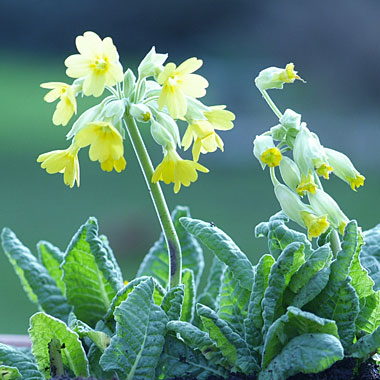


Cowslip
Primula veris

Cowslips are spring flowering, clump forming perennials.
Whilst they are becoming increasingly rare in the wild
they are easy to grow in the garden with attractive green oval shaped leaves and deep yellow scented flowers.
More info:
Spreading clumps of cowslips look lovely in spring.
They can be planted in borders and also naturalise well in grass, which is their natural habitat.
Established plants will self-seed around the garden, however if this is desired then plant them well away from primroses.
Cowslips and primroses will hybridise and result in polyanthus plants, which are neither one nor the other.
The flowering stems rise above the leaves by 15 - 20cm (6 - 8in) carrying umbels of golden yellow fragrant flowers.
The shape of these clusters gives rise to the old traditional name of 'keyflowers'.
Historically cowslips were gathered in huge quantities to make wine and tonics,
which had a soporific and tranquillising effect.
Nowadays country wine making has lost its popularity although recipes still abound.
The flowers however can be added fresh to salads, after all the green sepals have been removed.
They can also be candied to make decorations for spring cakes and desserts.
Both the roots and the flowers have a great many medicinal and cosmetic uses.
Taken as a tea, cowslips have sedative and anti-inflammatory properties
and are also useful in calming respiratory problems such as coughs and bronchitis.
Externally skin complaints and arthritic pain are eased, to name but a few of the multitude of uses.
Cowslips should be avoided during pregnancy, and also by anyone taking warfarin or similar,
or with a sensitivity to aspirin.